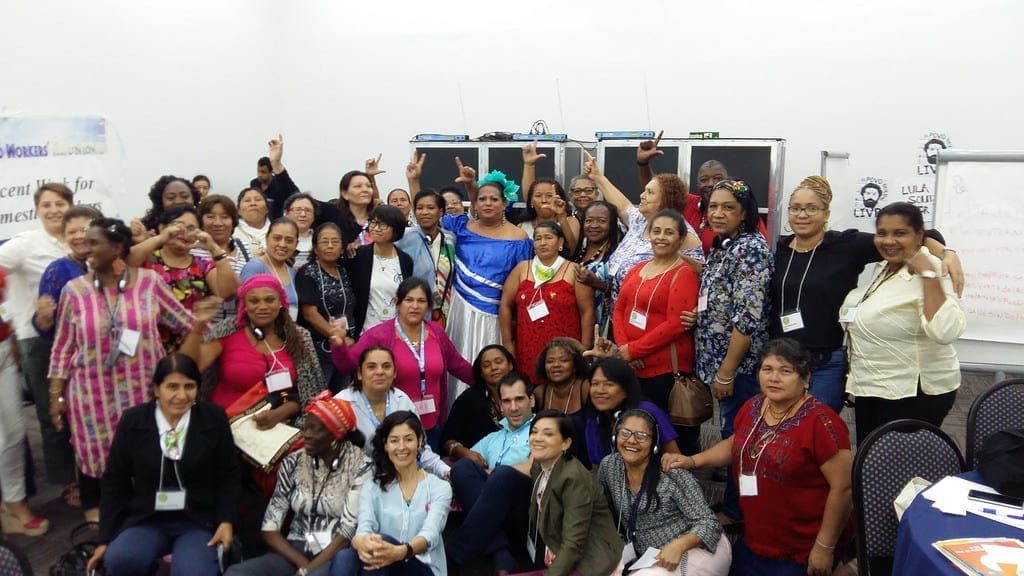
May 16, 2018
Some 40 domestic workers from 17 countries across North and South America and the Caribbean shared organizing tactics, hammered out resolutions and participated in Solidarity Center training on gender-based violence at work at a recent conference in São Paulo, Brazil.

A Solidarity Center gender equality training was part of the domestic workers’ conference. Credit: IDWF
The conference is one of a series of regional planning meetings domestic workers around the world are holding in advance of the International Domestic Workers Federation (IDWF) congress November 16–18 in South Africa. Domestic workers from all regions will bring recommendations to the IDWF Congress. Latin American domestic workers voted to recommend the IDWF adopt resolutions involving safety and health, strengthening leadership of Afro-descendent domestic workers where they are a majority and supporting LGBT domestic workers who face double discrimination on the job.
Delegates also nominated new leadership for the region, Andrea Morales from Nicaragua and Carmen Britez of Argentina, both former domestic workers.
In one of the most powerful moments of the conference, migrant domestic workers and Afro-descendent domestic workers shared their strategies during a panel on racial equality and, in the process, “restored dignity back to themselves and to the work they do,” says Adriana Paz, IDWF Latin America regional coordinator.
“Most domestic workers labor in modern slavery conditions without being paid but instead just provided with board and room—just like in slavery times,” says Paz, who participated in the conference. “Added to this lack of rights and freedoms, Afro-descendant domestic workers face the structural violence inflicted on them because of the intersection of their race, class and gender.”
In Brazil, 70 percent of domestic workers are Afro-descendent as are a majority of domestic workers in Colombia, who also are often internal migrants, moving from rural areas to large cities for employment.
Steps to Ensure Brazil Enforces Domestic Worker Standard
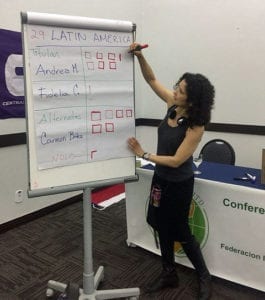
Credit: IDWF
Brazil’s ratification of International Labor Organization Convention (ILO) 189 on domestic workers’ rights earlier this year led to discussions about how Brazilian domestic workers could ensure the government is in compliance with the convention. Domestic workers from countries that have ratified Convention 189 say the first step is to push for creation of employer organizations so domestic workers have a collective employer with whom to negotiate contracts.
Enforcement of domestic workers’ rights is difficult in Brazil because the constitution does not allow authorities to “inspect” private homes, a challenge Argentine domestic workers say they have addressed by sending out mobile vans in neighborhoods where they find employers with domestic workers. From the vans, union staff and labor ministry representatives discuss with employers how to formalize workers and have paperwork ready for employers and specific materials for domestic workers as well.
Conference participants also took part in a Solidarity Center workshop on the upcoming International Labor Conference (ILC), where representatives from labor, employers and governments will negotiate a draft convention addressing gender-based violence at work. Five domestic workers from Latin America will attend the May 28–June 8 ILC, all of whom were active in the international campaign for passage of Convention 189 in 2011.
Domestic workers in the Africa, Asia and European regions held regional conferences earlier this year.
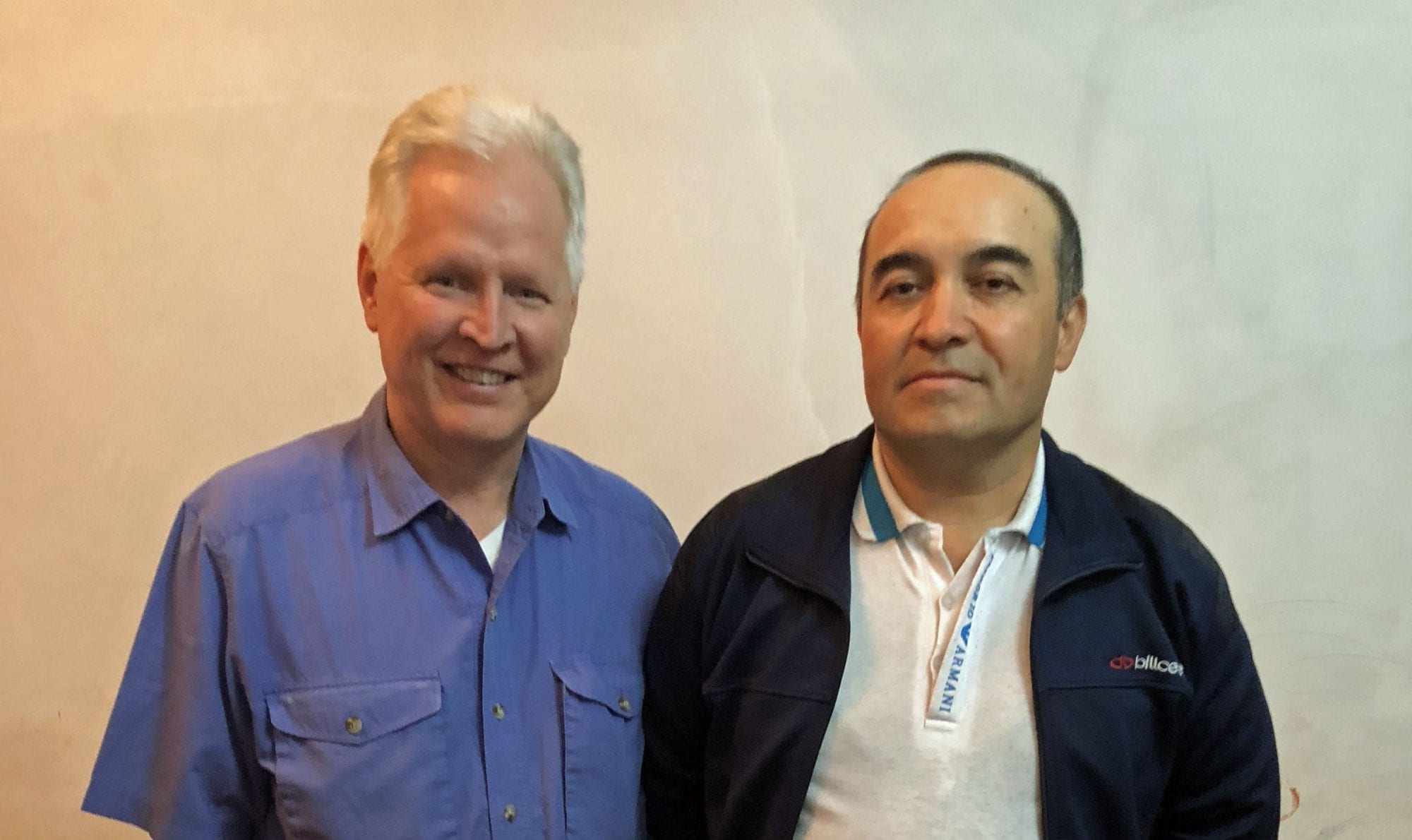
May 15, 2018
Uzbek union activist Fakhriddin Tillayev, in prison on a 10-year sentence and subjected to torture for attempting to organize an independent union for day laborers, was released over the weekend.
Tillayev’s release was among the results sought by a Cotton Campaign delegation, now in Tashkent, Uzbekistan’s capital, for unprecedented meetings with government officials, civil society advocates and human rights monitors to discuss the eradication of forced labor. During last fall’s harvest, the Uzbek government forced 336,000 people—including teachers, doctors and students—to work in the country’s cotton fields, picking a crop that generates nearly a quarter of the nation’s GDP, according to an International Labor Organization (ILO) survey. The Cotton Campaign believes the number of those forced to labor is higher.
Tillayev’s release “is a very positive step by the government,” says Solidarity Center Europe and Central Asia Regional Program Director Rudy Porter, who met with Tillayev after his release. Human Rights Watch, the Uzbek-German Forum for Human Rights, Cotton Campaign staff and the Solidarity Center all followed Tillayev’s case closely since his sentencing in 2014 and raised demands for his release in each meeting with the government.
Tillayev and his fellow activist, Nuriddin Jumaniyazov, were falsely accused of human trafficking, tortured and convicted in proceedings that violated fair trial standards. Jumaniyazov, who was sentenced to six years on the same charges as Tillayev, died in prison of complications related to diabetes in December 2016, information that was not made public until June 2017.
Tillayev said he and Jumaniyazov were arrested after they collected membership applications for an independent union from many people looking for day labor at eight markets in Tashkent.
“They had no other work, they needed protection, they needed their own union. The Administrative Court fined each of us 7 million Soum [$875] because we organized an independent union. They banned the independent union. And then they came up with a criminal offense to put us away for good.”
Seeking a Formal Plan to Dismantle State-Sponsored Forced Labor
Cotton Campaign coalition representatives are in Uzbekistan seeking legal and policy reforms to end the mobilization of education and healthcare workers to harvest cotton. They also are calling for an to end the practice of forcing those who refuse to go to the fields to pay for replacement workers.
The delegation seeks a formal plan to dismantle the forced labor system, and an accountability mechanism that allows for secure complaints and legal actions against officials who mobilize citizens. The Cotton Campaign delegation does not include forced labor monitors and will not assess Uzbekistan’s progress toward eliminating forced and child labor in cotton production.
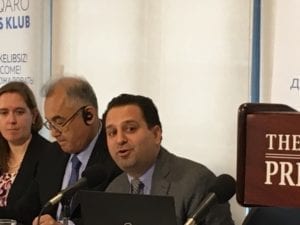
Steve Swerdlow from Human Rights Watch says “one of the biggest developments in Uzbekistan has been the release of political prisoners.” Credit: Solidarity Center/Tula Connell
The Cotton Campaign sees these meetings as among “recent encouraging signs that the Uzbek government is willing to talk about the subject of forced labor.” Last week, the government released journalists imprisoned on political grounds.
Noting that Uzbekistan has released 28 political prisoners in the past 20 months, Steve Swerdlow, Human Rights Watch Central Asia researcher, says “one of the biggest developments in Uzbekistan has been the release of political prisoners.” Swerdlow spoke May 14 as part of an Uzbekistan-sponsored press conference in Washington, D.C., to discuss its progress on human rights and prospects for improvement.
Uzbek President Shavkat Mirziyoyev acknowledged forced labor in cotton production in a speech at the United Nations in September, the first time a high-ranking Uzbek government official had done so in a public forum. Mirziyoyev again repudiated forced labor in April when he referenced teachers being mobilized for street cleaning and other “public works.” With its partners in the Cotton Campaign, the Solidarity Center advocates for the complete eradication of forced labor and forced child labor in Uzbekistan.
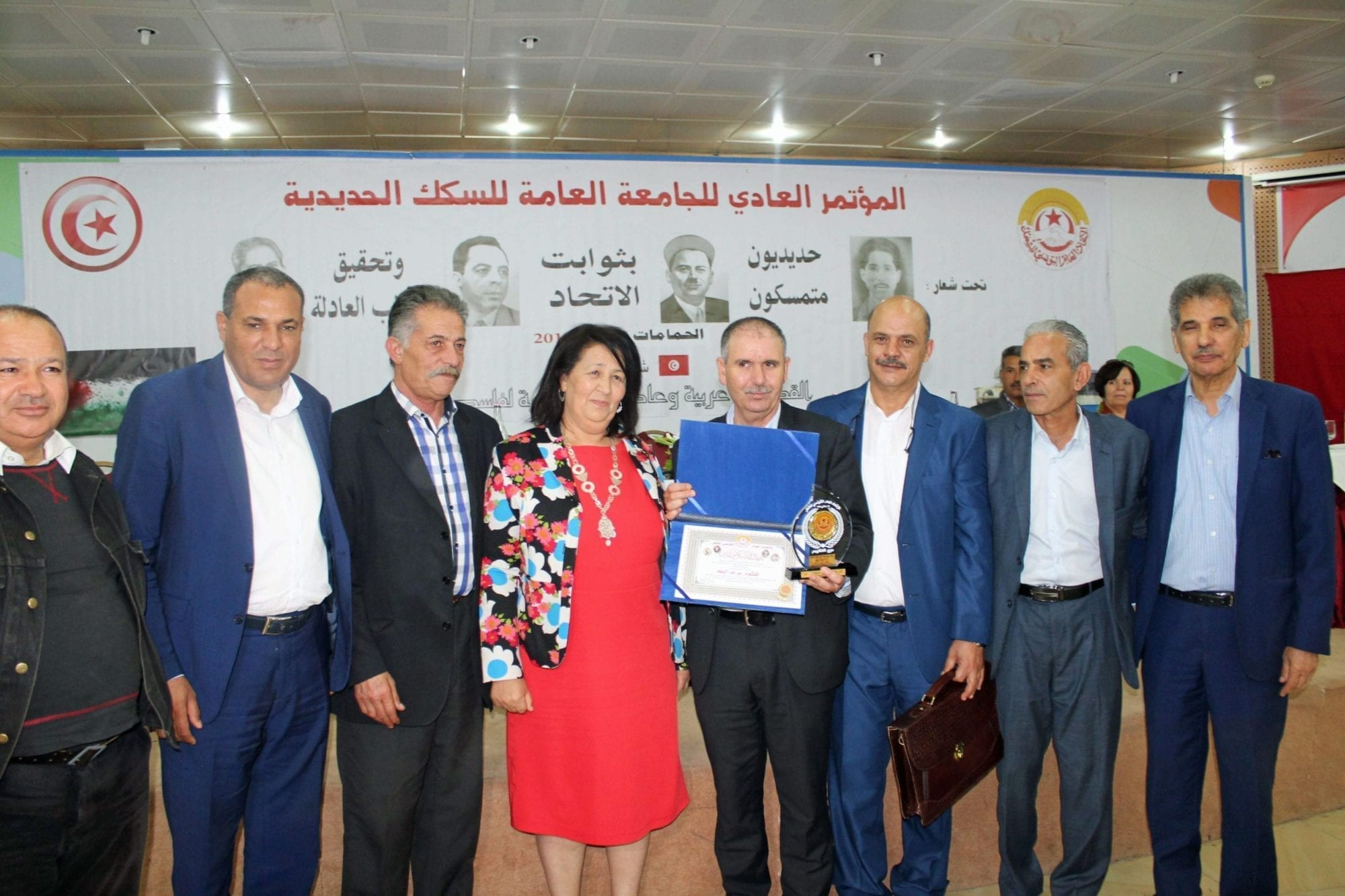
May 9, 2018
Kalthoum Barkallah, Solidarity Center senior program officer and master trainer in Tunisia, this week received a lifetime achievement award from the General Union of Tunisian Workers (UGTT). The award, the nationwide union’s highest honor, is given to union activists for their dedication to union work and in recognition of their struggle in the defense of workers and human rights.
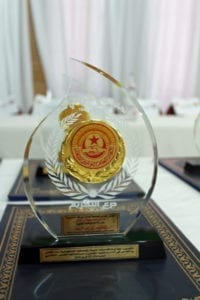
The UGTT award is the union’s highest honor.
“We are enormously proud of Kalthoum and the great contribution she brings to the labor movement through her incredible dedication and accomplishments,” says Hind Cherrouk, Solidarity Center country program director for the Maghreb region. “Kalthoum’s expertise in nurturing and training new generations of leaders, especially women unionists, has ensured the labor movement in Tunisia and beyond is served by new, skilled union activists.”
Presented by UGTT General Secretary Noureddine Tabboubi, the award reads: “Honoring sister and union activist Kalthoum Barkallah in appreciation for her dedication and perseverance in support for union work.”
In conferring the award, Taboubbi noted Kalthoum’s popularity among the UGTT’s union structures from local to national.
“When I began the struggle for democracy, freedom and the rights of women in 1979, I never for a moment imagined that there would be a day when I would be recognized or honored for my part in realizing these noble objectives,” says Barkallah.
Building Women’s Leadership in Their Unions
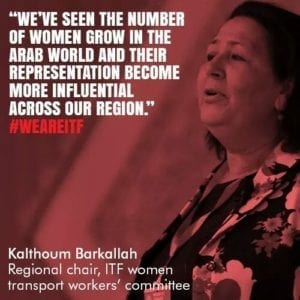 As an activist with the Tunisian General Federation of Railways, Barkallah was first elected as a deputy general secretary in 1983, heading up training within the union. She later was elected deputy general secretary in charge of international relations. In the railways industry, Barkallah was known as the “iron lady” for her determination and struggle to challenge her male colleagues in a male-dominated sector to achieve equality and justice for all.
As an activist with the Tunisian General Federation of Railways, Barkallah was first elected as a deputy general secretary in 1983, heading up training within the union. She later was elected deputy general secretary in charge of international relations. In the railways industry, Barkallah was known as the “iron lady” for her determination and struggle to challenge her male colleagues in a male-dominated sector to achieve equality and justice for all.
As an active union leader with the UGTT, Barkallah built on the gender empowerment training she began in the railway sector to reach union members in a variety of industries throughout Tunisia, championing women’s rights there and supporting her sisters beyond its borders.
Barkallah, who in 2006 was elected president of the International Transport Workers’ Federation (ITF)–Arab Women’s committee, also recently received an award from the ITF Women’s Committee for her fight and struggle in support of women workers in the transport sector.
Throughout her decades of service to workers and their unions, Barkallah balanced both work and family duties, raising two sons who each now have their own children.
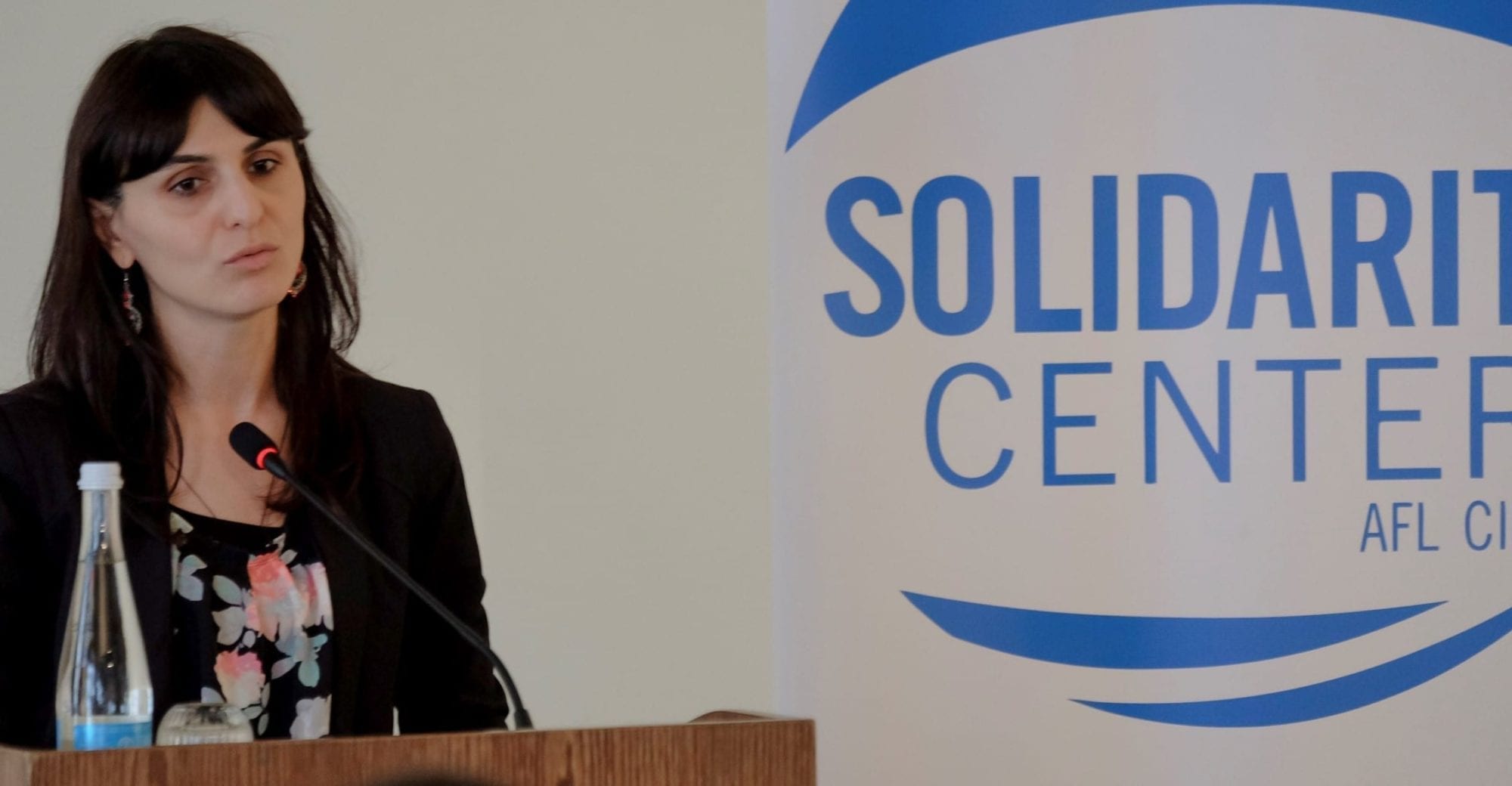
May 7, 2018
Three new Georgian books will help increase access to legal information and justice for workers and the organizations that represent them.
The titles, which compile international labor standards and norms and national laws into three volumes, were presented at a Solidarity Center book launch in Georgia last week.
“A low level of awareness among workers about their fundamental labor rights still persists in Georgia and exposes workers, including trade union members, to severe violations,” said Stanislaw Cieniuch, Solidarity Center Georgia country program director, during his keynote speech.
Raissa Liparteliani, vice president of the Georgian Trade Unions Confederation (GTUC), said that the new books will solve the problem of lack of access to labor norms, which have not been available in a single source. President of the Construction Workers Union of Georgia—a GTUC affiliate—Marina Kurtanidze, added that the books will contribute significantly to GTUC labor law education programs.
The event was attended by trade union leaders, labor lawyers, representatives of the government and the Parliament of Georgia, employers’ associations, the international and diplomatic community, non-governmental organizations and academia, and was covered by several mass media outlets.
The books, available in Georgian only, include: Commentary on Labor Code of Georgia; Collection of Legal Acts Related to Labor and Trade Union Activities; Labor Rights of Public Servants.
In Georgia, the Solidarity Center works with trade unions to support their ability to engage effectively with employers and government representatives, in partnership with the GTUC, which represents 147,000 members and 19 affiliated unions. Amid intense political pressure, the GTUC maintains its independence as an advocate for worker rights and respect for all civil society partners. Read more here.
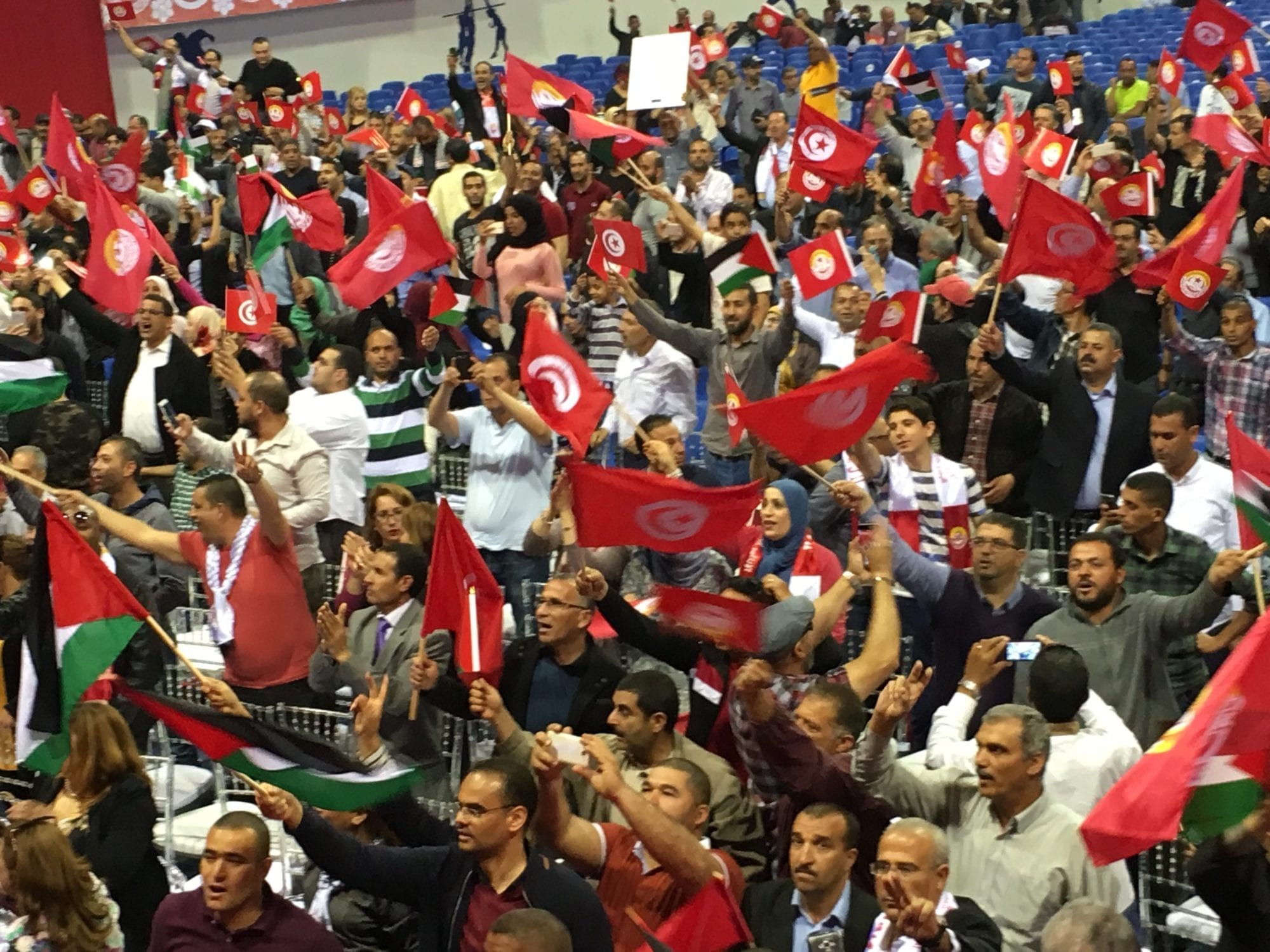
May 1, 2018
Chanting support for their union and for worker rights, more than 7,000 members of the General Union of Tunisian Workers (UGTT) packed the Menzah Sports Palace in Tunis today in a boisterous, enthusiastic May Day celebration.

“We are committed to defend worker rights and workers’ interests and we shall struggle for more justice, equality and freedom”–UGTT Secretary-General Noureddine Tabboubi Credit: Solidarity Center/Tula Connell
“Our principles are to defend the independence of this country and to defend the people of this country,” said UGTT Secretary-General Noureddine Tabboubi. “We are committed to defend worker rights and workers’ interests and we shall struggle for more justice, equality and freedom. We shall combat all forms of abuse and oppresssion.”
In a speech interrupted frequently by chants of “Long live UGTT” and “With blood and with spirit we remain loyal to the UGTT,” Tabboubi outlined the union’s efforts to work with the government in reforming public services without resorting to privatization, a move the union says would lower wages and create precarious jobs and reduce or eliminate access to pensions and health care.

“The UGTT’s priority is for the national interest”–UGTT member Dhouha Kouki Credit: Solidarity Center/Tula Connell
UGTT has been the leading force in protecting democratic gains following the 2011 Tunisian uprising in which workers, outraged at high unemployment and low wages despite the country’s economic prosperity, ousted Tunisia’s dictator, Zine el-Abidine Ben Ali. During the ensuring interim government, UGTT proposed a constitution that included the freedom to form unions and strike, proposals that were maintained when the new constitution was approved.
“In the light of the weakness of the different goverments, the UGTT remained the only reasonable power that ensured stability, but it also ensured a balance between workers and the government,” says Dhouha Kouki, a call center worker and UGTT member who took part in the May Day celebration. “UGTT’s priority is for the national interest.”
As workers waved Tunisan and UGTT flags, some wearing shirts imprinted with the demands of the 2011 uprising–“Employment, Freedom, National Dignity”–Taboubi said: “The goals of our revolution shall be achieved and nobody can confiscate our right to freedom, dignity and social justice.”
Economy Teeters on Crisis
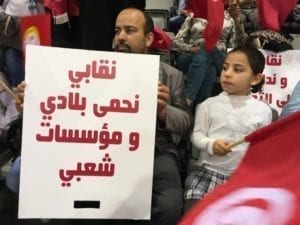
A UGTT member holds a sign reading, “I am a trade unionist and I defend my country and my fellow citizens’ institutions.” Credit: Solidarity Center/Tula Connell
With 750,000 members across Tunisia, UGTT represents mineworkers, textile workers, professional employees and many others, including 75 percent of public-sector employees. The union federation has organized 250,000 members since the 2011 uprising, many of whom were formerly subcontracted government employees with low wages, no access to social benefits or secure employment. UGTT worked with the interim government within a month of the revolution to bring subcontracted workers into full-time employment, says Sami Tahri, secretary-general in charge of information.
Since then, the UGTT, a Solidarity Center partner, negotiated a 6 percent wage increase for private-sector workers in 2012, an 11 percent increase in the mininum wage in 2014, and an improved contract for high school teachers in 2015, according to “Workers and Thieves: Labor Movements and Popular Uprisings in Tunisia and Egypt.”
Yet the increasing number of workers in the informal sector–which represents more than 54 percent of the country’s gross domestic product–lack of investment in job creation, especially by financial institutions, and an official unemployment rate of 16 percent, including 250,000 university graduates in a country of 11.6 million, mean Tunisia is facing an economic crisis, says Tahri.
Workers in the informal economy are “deprived of all their economic rights and have no social protection like paid sick leave or pensions,” he says, speaking through a translator. Tahri says the official unemployment rate is likely much higher because many people are not counted.
Retirees are suffering the most, especially those who worked for private employers, Tahri says. Many private-sector employers do not fully pay into the country’s social security system, resulting in pensions so low that 25 percent of retirees receive less than the minimum wage, and another 30 percent receive only the minimum wage, says Tahri.
Creating a ‘Solidarity Economy’
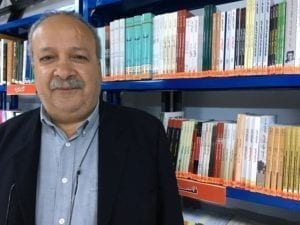
Sami Tahri, UGTT Secretary General in charge of Communications, says UGTT is assisting workers through multiple strategies. Credit: Solidarity Center/Tula Connell
The UGTT is tackling the challenges facing Tunisian workers through organizing and legislative action. In partnership with allied organizations, including the Solidarity Center, UGTT is organizing rural workers in Tunisia’s long-neglected interior, where most of the 1.5 million agricultural workers are women who are not covered by social benefits like pensions and who toil in dangerous and harsh conditions, often into their seventies.
The UGTT also submitted legislation to the national parliament that would create a “solidarity economy” in which the government finances young workers, especially those in agriculture, service and handicrafts, to create their own “start-ups,” with part of the profits returning to the government to fund more new enterprises. By targeting workers in the informal economy, the program also would bring more workers into the social security system, which also is underfunded because there are now five retirees for every one worker. In the 1970s, Tahri says, the ratio was reversed.
Additionally, UGTT has reformed internal union structures to reflect women workers, who comprise the majority of workers in industries such as education, health care and auto parts manufacturing. In 2017, the UGTT Executive Board voted to require executive boards at all levels of the union to include at least two women and better represent its membership.
In 2013, the UGTT was instrumental in brokering a peaceful path to democracy as part of the Tunisian “Quartet,” which was awarded the 2015 Nobel Peace Prize.








 As an activist with the Tunisian General Federation of Railways, Barkallah was first elected as a deputy general secretary in 1983, heading up training within the union. She later was elected deputy general secretary in charge of international relations. In the railways industry, Barkallah was known as the “iron lady” for her determination and struggle to challenge her male colleagues in a male-dominated sector to achieve equality and justice for all.
As an activist with the Tunisian General Federation of Railways, Barkallah was first elected as a deputy general secretary in 1983, heading up training within the union. She later was elected deputy general secretary in charge of international relations. In the railways industry, Barkallah was known as the “iron lady” for her determination and struggle to challenge her male colleagues in a male-dominated sector to achieve equality and justice for all.




